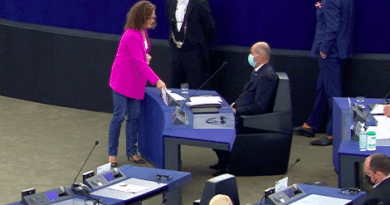Europe behind on crime
(B2 archives *) By December a European criminal record will be offered, says the European Commission. This idea of creating a European criminal record will not be enough. We must provide Europe with a true common code of criminal procedure.
A snow-white locker
THEMichel Fourniret case reveals the lack of Europe. This French citizen, several times condemned in France apparently, lived in Belgium, white as snow. His criminal record, consulted on several occasions by the Belgian authorities, mentions " nothingness ". In 2003, he was able to obtain a certificate of good morals and work in a school as a canteen supervisor! How can a hardened criminal find a virginity on the other side of the border?
A fledgling European penal area
A fragmented judicial space
Aberrant? No, logic answer the specialists of the file. At the time of the single market and the free movement of people, there is indeed a flaw. The European judicial area remains fragmented between 25 different, even divergent, systems. States remain reluctant to share their powers. It is only since the Treaty of Amsterdam, in 1997, that the European Union has acquired competence in these strictly sovereign matters. It was only in Tampere, in 1999, that the Heads of State and Government launched a first legislative programme. The stated objective was clear: Offenders must not be able, by any means, to take advantage of the differences between the legal systems of the Member States ».
From speeches to actions, there is a chasm!
The organization supposed to ensure the exchange of information, Europol, without resources and obsessed with its internal functioning, has become encrusted in an administrative hum. The possibility of having joint investigation teams, in particular for fight against human trafficking », remained unusual. In fact, it was only under the battering of the attacks in New York in 2001, and especially in Madrid, last March (2004), that the political leaders seemed to become aware of the danger.
An achievement: the European arrest warrant
The European penal area in this way is still in its infancy. The only concrete realities are the European arrest warrant which has just entered into force, and the evidence warrant which is under discussion (see below). Otherwise, it is almost impossible to know, beyond the borders, if a European is white as snow or has committed crimes in his country of origin or elsewhere. There is no European criminal record.
A white paper for the end of the year
« It's true recognizes Pietro Pietrucci, spokesperson for the Commission. The idea of the criminal record was already " referred to the European Commission » confirms Pietro Petrucci, spokesperson at the European Commission. " It took March 11 (and the attacks in Madrid) for governments to realize this lack and include it in their priorities. » Done on March 25. " The Commission is therefore preparing a white paper next November or December. It will be accompanied by two legislative proposals providing for the exchange of information and the way in which its information is taken into account ».
The reluctance of States...
It remains to fix its content. " We believe that the scope should be the same as the European arrest warrant, so that there is criminal continuity ". But some States, jealous of their age-old prerogative and obsessed with the fight against terrorism, do not all have this vision and seem to want as limited a field of application as possible. After the emotion of the attacks, reluctance then took over. If the European arrest warrant is effective today, its complement, " our proposal for an evidence warrant received a mixed reception from ministers regrets Pietro Petrucci, spokesperson for the Commission. And the project to define common rights for defendants has been widely criticized, especially by the British.
Belgium ahead of a war
On the Belgian side, we are in any case resolved not to sit idly by. The Minister of Justice, Laurette Onkelinx, indicated yesterday (Thursday), to have " contacted the Presidency of the European Union and received the latter's assurance of its desire to complete the European criminal records initiative by the end of the year ". The Minister also confirmed to our colleagues at RTBF that she was studying " very seriously "the possibility of creating" a supplement to the criminal record which would contain certain erased convictions (for sex offenders) and of which it is nevertheless necessary to have a trace ". This locker would not be accessible to the general public. We have seen the errors that this generated, in the United Kingdom in particular. But would be very strictly limited ».
A red tape seen with reluctance ... by the Commission
The Commission is, on the other hand, less enthusiastic about the project to create a "double register", a file containing the DNA of sex offenders, an idea nevertheless supported by all specialists in the fight against pedophilia and taken up by the French Minister of Justice. , Dominique Perben, who wrote a few days ago to his counterparts on this subject.
A necessity: to accelerate the establishment of a minimum criminal procedure framework
Tracking measures not included
The existence of a European record in a case like that of Michel Fourniret, who plays leapfrog with the Franco-Belgian border would not solve everything. This case also raises the delicate issue of tracking criminals. However, the measures of probation or psychological follow-up remain the exclusive responsibility of the court which pronounced it. Nothing is planned to transmit this responsibility to the judicial authorities of the State where the former convict resides!
A necessity: also harmonize the content
In this context, the Fourniret case is a " excellent case study comments a European diplomat, magistrate by profession. " This case shows it. Creating a European Criminal Record will not be enough. It is also necessary to harmonize its content ". The national criminal record is, in fact, the reflection of the prescriptions, suspended sentences, amnesties and other cancellations of penalties specific to national law. So many countries, so many rules. The open site is therefore immense!
Criminal records as different as states
Not all countries have the same type of locker. In Italy, for example, there is only one criminal record, while in France there are three levels of records — one is accessible only to magistrates, the other to administrations, the third is more general and open to citizens —! Reviewing the problem of forfeitures (rights, public service, etc.) appears to specialists as the " most important ».
The absence of a joint investigation team
This case also highlights the lack of a joint investigation. Even with good coordination, nothing could replace a “real” joint Belgian-French investigation team. A European framework decision was adopted on this subject in June 2002 and entered (theoretically) into force at the end of 2003. But for the moment this is more wishful thinking than reality. Very few Member States have had the will to implement it.
The legal obstacle
As for a single trial, or at least the holding of two coordinated trials, there is no text that currently allows it. And it's not tomorrow the day before. Given the differences in procedures... Europe will not be able to do without a minimum code of common criminal procedure forever.
Comment: A reason for hope…
A reason for hope, however. The Dutroux affair had moved Europe a bit. By developing a decision against child pornography and a program, called Daphne, to assist children or women who are victims of violence. The Fourniret affair will perhaps make our Ministers of the Interior aware that freedom of movement is now a reality and that there is no point in having beautiful laws if they differ from one country to another and that it is impossible to get it executed, past the customs post... which no longer exists.
Nicolas Gros Verheyde
(*) Long and revised version of articles published in France-Soir, July 2, 2004, and Ouest-France

